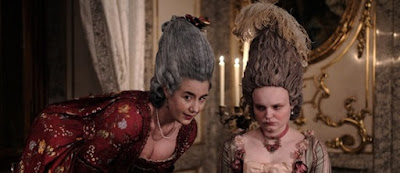Panorama Europe 2019, the eleventh edition of this unusual festival of new European cinema, co-presented by Museum of the Moving Image (MoMI) and the European Union National Institutes for Culture (EUNIC), includes a wide range of outstanding films by some of the continent’s most exciting emerging directors. The festival, which runs May 3 through 19 with a full slate at MoMI (in Queens) and two encore screenings at Bohemian National Hall (Manhattan), offers New Yorkers, along with those farther afield who don't mind trekking to NYC, an overview of the current European film scene.
The opening night selection is the New York premiere of Barbara Albert’s Mademoiselle Paradis, which stars Maria Dragus, (above, right, and one of Europe’s rising stars, known for her roles in The White Ribbon and Graduation), as an accomplished musician who is blind, bristling against the rigid social conventions of eighteenth-century Austria. The extremely talented and versatile Ms Dragus will participate in a conversation after the screening; followed by a reception.
You can find the entire festival slate by clicking here, and you can also read TrustMovies' earlier review of Mademoiselle Paradis (first posted in December of 2018 and re-posted below, thanks to the Panorama festival's giving this exceedingly fine movie yet another chance to be seen and savored).
Grounded by a spectacular central performance from Romanian actress Maria Dragus (whom you'll remember from her role as the pivotal daughter in Graduation), the latest film from Austrian filmmaker Barbara Albert would be a must-see for Ms Dragus' work alone. But MADEMOISELLE PARADIS demands a viewing for so many other good reasons, including its status as one of the finest "period" films to be seen in many years. Taking place in 1777, it offers such an eye-popping array of costumes, wigs, furniture, tableware and all the rest that there is almost never a moment when you will be able to look away for fear of missing something even more spectacular.
Winning the sets-'n-costumes award may seem like small potatoes, but when the potatoes are this exquisite, TrustMovies suggests taking note.
Ms Albert, shown at left (of Free Radicals and Falling, among other films), is noted -- in my book, anyway-- for most often combining ideas and current events/themes. What's particularly interesting about Mademoiselle Paradis is how the ideas and events on display, though well over two centuries old, seem as current as today.
As director and co-adaptor (with Kathrin Resitarits) of the novel by Alissa Walser, Albert tells the based-on-fact tale of Maria Theresia Paradis (Ms Dragus, below), a young woman who went blind during childhood and then became something of a piano prodigy.
Class differences are shown us via the "downstairs" maids, kitchen help and their offspring, including one young crippled boy who is both loved and taunted.
The male upper crust, of course, is shown blithely having his entitled way with the maid of his choice (Maresi Reigner, shown at right and at bottom)-- with predictable but nonetheless devastating results.
The "blindness," which Mesmer treats, seems to be receding, which of course makes us wonder if it might have been psychosomatic. Given the relationship Maria Theresia has with her nasty parents (Lukas Miko and Katja Kolm, above, left and center), this makes sense, but the filmmaker does not insist upon anything. She simply observes and lets us ponder.
Mesmer himself (well played by Devid Striesow, above, right) seems as much concerned with his own status in the medical world as with that of his patients (ever timely), but he also proves a real help to our heroine.
It seems utterly appalling that a movie this good (it's at 100 percent on Rotten Tomatoes) in so many ways -- Ms Dragus' superb performance is certainly among the year's best -- could not find even limited theatrical distribution here in the USA.
At least we're now able to see the film on DVD and streaming, thanks to First Run Features, which has released it here. It arrived on iTunes this past Tuesday, November 27, for streaming, and will hit DVD next Tuesday, December 11- - for purchase and/or (I would hope) rental.
Again, if you wish to view the complete
schedule for Panorama 2019,
simply click here.

















No comments:
Post a Comment